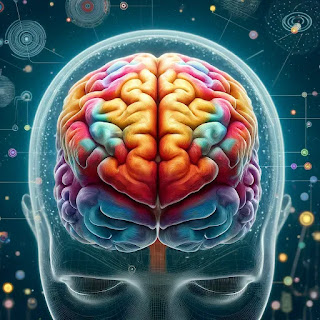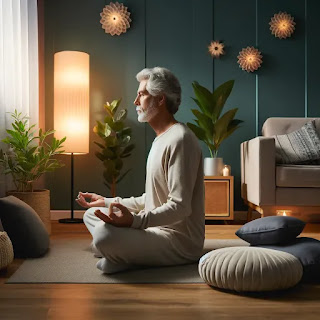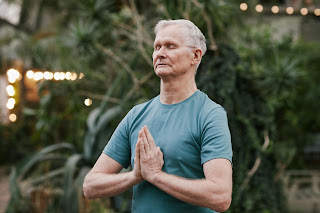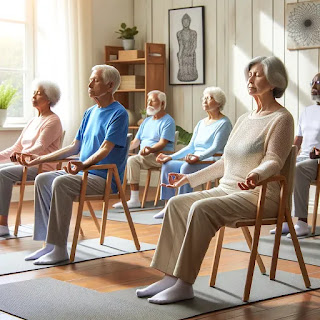Aging Minds Rejuvenated: The Impact of Meditation and Mindfulness on Mental Health
Learning to navigate life beyond 40, the importance of mental health and cognitive agility becomes increasingly apparent. Aging gracefully involves more than just maintaining physical health; it’s also about nurturing our mental well-being in a world that often prioritizes youth and speed. Meditation and mindfulness stand out not merely as trends but as vital tools for mental rejuvenation.
Rooted deeply throughout history, meditation offers a sanctuary for the aging mind, a quiet space amid life’s clamor where tranquil awareness can flourish. Mindfulness teaches us to live in the moment, embracing life without judgment. Together, these practices forge a robust foundation for mental resilience, helping us age with grace and poise. This article delves into the profound benefits of meditation and mindfulness for those over 40, blending scientific insights with practical guidance to empower your journey toward cognitive and emotional rejuvenation.

Meditation’s Role in Enhancing Cognitive Functions in Aging Populations
As the brain ages, maintaining cognitive agility becomes a priority for many. Meditation offers significant benefits in this regard, particularly for older adults seeking to preserve and enhance their mental capacities. Taking the time and steps necessary to expand your thinking with meditation in moderate levels of growth. Let’s dive into the benefits of putting in the work practicing meditation.
Boosting Cognitive Abilities through Meditation Research has consistently shown that meditation can positively affect the brain’s structure and function, leading to improved memory, better problem-solving skills, and enhanced attention spans. These benefits are particularly crucial for older adults, as they help counteract the natural cognitive decline associated with aging. Meditation practices like focused attention and mindfulness have been shown to increase neural plasticity, which is the brain’s ability to reorganize itself by forming new neural connections throughout life.
The Science Behind Meditation and Brain Health Neuroscientific studies have provided insights into how meditation contributes to brain health. For example, research indicates that regular meditation increases gray matter density in regions of the brain associated with learning, memory, and emotion regulation. Additionally, meditation has been linked to longer telomere length—a biomarker for cellular aging. Telomeres, the protective caps at the end of our chromosomes, naturally shorten as we age, but several studies suggest that meditation may slow this process, potentially reducing the risk of age-related diseases.
Meditation and Research Findings Significant studies, including those conducted by major universities and health institutions, have explored the connection between meditation and cognitive decline. One landmark study reported by researchers found that individuals who engaged in regular meditation practices showed less age-related decline in brain structure compared to those who did not meditate. Furthermore, meditation practitioners often demonstrate better performance on cognitive tests, underscoring the practice’s potential to maintain mental clarity and reduce the cognitive deficits often seen in older adults.
Practical Applications for Older Adults Incorporating meditation into the daily routine of older adults can be straightforward. Starting with just a few minutes of seated meditation or mindfulness each day can yield noticeable improvements in mental function and overall well-being. For those new to meditation, guided sessions or community classes specifically designed for older adults can provide support and motivation.

The evidence supporting meditation’s role in preserving cognitive function and enhancing brain health is compelling. For aging adults, regular meditation not only supports mental agility but also contributes to a healthier, more resilient brain, capable of withstanding the challenges of aging. This practice proves to be a vital tool in the quest for longevity and mental acuity.
The journey through midlife and beyond brings with it a unique set of challenges and opportunities. As our bodies and brains age, we are confronted with the reality of change — not just physically, but mentally. However, it is also a period ripe with potential for growth, transformation, and deep self-reflection. The question then arises: How can we harness the power of meditation and mindfulness to support our mental health as we age?
Enter the pioneering research of neuroscientist Andrew Huberman, whose work sheds light on the remarkable plasticity of the aging brain. His studies provide compelling evidence that meditation and mindfulness practices can significantly impact our mental health, enhancing cognitive function and emotional well-being, regardless of our age. This scientific exploration not only validates the benefits of these ancient practices but also offers hope and practical strategies for those seeking to preserve and enhance their mental acuity.
As we delve deeper into this topic, we aim to demystify the science behind meditation’s impact on the aging mind and offer practical guidance for incorporating these practices into our daily lives. Whether you’re a seasoned meditator or a curious newcomer, this article promises to provide valuable insights and inspiration to support your journey towards mental health and cognitive rejuvenation. So, let’s embark on this exploration together, embracing the wisdom of meditation and mindfulness to protect our memories and enrich our lives as we age.
Meditation and Mindfulness
In an age where the pursuit of mental clarity and emotional stability has become paramount, meditation and mindfulness stand out as beacons of hope for individuals navigating the complexities of life beyond 40. These ancient practices, rooted in centuries-old traditions, have made a resounding comeback, promising a plethora of benefits that extend well beyond the realm of physical well-being. For those of us in this vibrant chapter of life, they offer not just a path to mental rejuvenation but a journey towards sustained cognitive vitality.
Mindfulness meditation has helped me bring a much clearer focus on my daily activities. Taking moments to to bring my attention to my breath, bring attention to the quality of my thoughts. Without judgment I ensure I’m navigating a positive mindset. As I grew into my mindfulness practice I would bring my attention to my senses, I liked to focus on touch and sounds when I first started. This brought my focus to what I was doing in the current moment. Not only did I find improvement in my focus on other areas but when I was in my flow the quality of my work improved significantly.

Embracing Meditation: A Gateway to Inner Peace
Meditation is often misconceived as a daunting practice reserved for the serene and secluded. Yet, at its core, it is a simple and accessible tool designed to foster a deep connection between the mind and body. Through various techniques, from focused attention to mindfulness meditation, this practice encourages us to slow down, breathe, and immerse ourselves in the present moment. For individuals over 40, it serves as a powerful antidote to the stresses and distractions of daily life, offering a sanctuary where one can find calmness, clarity, and a renewed sense of purpose.
Use this time to center yourself within, anchored in your breath explore the state of your mind without judgement, just sit with yourself guided by your breath.
The Essence of Mindfulness: Living in the Moment
Mindfulness, closely linked with meditation, is the art of being fully present and engaged with the here and now, without distraction or judgment. It teaches us to observe our thoughts, feelings, and physical sensations just as they are, fostering a state of open awareness and acceptance. This practice is particularly beneficial as we age, helping us cultivate a deeper appreciation for life’s simple pleasures and the beauty and meaning of everyday moments. By embracing mindfulness, we learn to navigate the inevitable challenges of aging with grace, resilience, and a positive outlook.
The Benefits Unveiled
The benefits of meditation and mindfulness are vast and well-documented, extending far beyond the confines of mental health. Research has shown that regular practice can lead to significant improvements in stress reduction, emotional regulation, and overall cognitive function. For those over 40, these benefits are particularly compelling, offering tangible ways to combat the effects of aging on the brain. As well as aid in the transition into the next session of the journey. Meditation has been linked to enhanced memory, increased focus, and even the potential to slow down cognitive decline, making it an invaluable tool in our quest for mental longevity.
Mindfulness and Improved Sleep Patterns
Sleep issues are common among older adults, with many experiencing disrupted sleep patterns that can affect their overall health. Mindfulness meditation has been identified as an example of a beneficial practice for improving sleep quality. Techniques like guided imagery, mindful breathing, and progressive muscle relaxation can prepare the mind and body for sleep.
Integrating mindfulness practices into evening routines can help calm the mind and reduce the stress and anxiety that often interfere with sleep. This can be as simple as performing a few minutes of meditation before bed to enhance deep, restorative sleep, ultimately improving energy levels and mood
After several months of meditation I found that I had huge changes in my sleep patterns. I was sleeping on a more consistent sleep patterns, less midnight wake ups but most importantly an easier time falling asleep. Incorporating a meditation technique to my night routine helped me fall asleep in minutes and I have found that I’m remembering more of my dreams than ever before.
A Practice for All
One of the most beautiful aspects of meditation and mindfulness is their universality. Regardless of age, background, or belief system, these practices are accessible to everyone. They require no special equipment or location; a quiet space and a few moments of your day are all that’s needed to embark on this transformative journey. For individuals over 40, incorporating meditation and mindfulness into daily life can be a powerful step towards achieving a balanced, healthy, and fulfilled existence.
The Path Forward
As we continue to explore the impact of meditation and mindfulness on mental health, it’s clear that these practices hold the key to not just surviving but thriving in our later years. They offer a path to enhancing our cognitive abilities, nurturing our emotional well-being, and finding joy in the present moment. With dedication and consistency, meditation and the other forms of mindfulness training can become invaluable allies in our journey towards mental rejuvenation and a vibrant, fulfilling life beyond 40.

Understanding the Aging Brain
As we journey into the later stages of life, particularly after the age of 40, our brains undergo a series of natural transformations. These changes can significantly affect cognitive functions, mental health, depression, and overall quality of life. However, understanding these shifts is the first step toward mitigating their impacts and uncovering strategies to foster mental agility and well-being.
Cognitive Changes with Age
Research has long indicated that aging is associated with cognitive decline, affecting memory, processing speed, problem-solving skills, and attention. A study by the National Institute on Aging highlights that while certain areas of cognitive function tend to decline, others, such as vocabulary and certain types of knowledge, remain stable or even improve with age. This dichotomy underscores the complexity of the aging brain and the potential for growth and adaptation.
The Role of Neuroplasticity
Neuroplasticity, or the brain’s ability to form and reorganize synaptic connections, especially in response to learning or experience, plays a crucial role in our cognition and combating cognitive decline. A landmark study by Dr. Michael Merzenich and colleagues demonstrates that engaging in activities that challenge the brain can enhance cognitive plasticity and function, even in older adults. These findings suggest that the aging brain is far from static and can continue to evolve and adapt with appropriate stimulation.
Impact of Stress and Lifestyle
The aging process is also influenced by external factors, such as stress and lifestyle choices. Chronic stress, in women in particular, has been shown to have a detrimental effect on brain structure and function, exacerbating age-related decline. Conversely, a healthy lifestyle that includes regular physical activity, a balanced diet, social engagement, and cognitive challenges can support brain health and mitigate the effects of aging. A study by Dr. Elizabeth Blackburn and Dr. Elissa Epel found that stress management, including meditation, could slow the rate of cellular aging by preserving telomere length, the protective caps on the ends of chromosomes that shorten with age.

Diverse Responses to Aging
It’s essential to acknowledge that individuals experience aging differently due to genetic, environmental, and lifestyle factors. For instance, a study published in the Journal of the American Geriatrics Society highlighted significant variability in cognitive function among older adults, with some showing little to no decline and others exhibiting more pronounced changes. This variability underscores the importance of personalized approaches to supporting brain health as we age.
Strategies for Maintaining Cognitive Health
The growing body of research on the aging brain provides valuable insights into strategies for maintaining and even enhancing cognitive health. Engaging in regular physical exercise, maintaining social connections, pursuing lifelong learning, and practicing mindfulness and meditation are all evidence-based approaches that can support brain health and cognitive function in later life.
In conclusion, while aging is an inevitable part of life, our understanding of the aging brain has evolved significantly. The evidence points to a hopeful message: with proactive measures, including mental and physical activities tailored to individual needs and preferences, we can support our cognitive health and enjoy a vibrant, mentally active life beyond 40.
Mindfulness-Based Stress Reduction: A Clinical Approach to Wellbeing
Mindfulness-Based Stress Reduction (MBSR) is a structured program that combines mindfulness meditation, body awareness, and yoga to help people cope with stress, other anxiety symptoms, and pain. Initially developed by Dr. Jon Kabat-Zinn at the University of Massachusetts Medical School, MBSR has gained recognition through numerous clinical trials for its effectiveness in enhancing mental and physical health.
Benefits for Mental and Physical Health MBSR programs are particularly beneficial for older adults, offering a robust method to reduce stress and manage the physiological effects of aging. Clinical trials have demonstrated that participants in MBSR programs experience significant reductions in symptoms of stress and anxiety. Furthermore, these programs help alleviate depressive symptoms, making them a valuable tool for maintaining mental health in later life.
Research and Clinical Trials Extensive research supports the efficacy of MBSR. A meta-analysis of clinical trials focusing on MBSR revealed consistent improvements in mental health, specifically in areas related to negative thoughts and emotions and anxiety management. These studies underscore the adaptability of MBSR to meet the needs of older adults, providing them with strategies to enhance their mindfulness practice and cope with daily stressors.
Incorporating MBSR into Daily Life For those interested in integrating mindfulness into their routine, MBSR offers a structured pathway that can be adapted to individual needs. Programs typically run for eight weeks and include weekly group sessions and daily home practices. This format helps embed mindfulness deeply into one’s lifestyle, promoting sustained mental health benefits.
Tailoring MBSR for Older Adults Given the challenges associated with aging, such as increased risk for chronic diseases and cognitive decline, MBSR programs can be particularly impactful. By focusing on body scan meditation, mindful breathing, and gentle yoga, MBSR programs can be tailored to accommodate the physical limitations often faced by older adults, ensuring accessibility and effectiveness.

Summary
Mindfulness-Based Stress Reduction is more than just a meditation program; it is a comprehensive approach to mental health that has been clinically proven to reduce stress and improve quality of life. For older adults, it offers a practical and adaptable tool to enhance cognitive function, manage stress, and navigate the complexities of aging with resilience and clarity.
Scientific Insights: Meditation’s Impact on the Aging Brain
In the quest to understand the nexus between aging, mental health, and cognitive preservation, the work of Dr. Andrew Huberman, a renowned neuroscientist at Stanford University, offers groundbreaking insights. His research sheds light on the tangible benefits of meditation and mindfulness practices, especially for the aging population, through the lens of neuroplasticity and brain health.
Unveiling the Power of Neuroplasticity
Dr. Huberman’s studies illuminate the concept of neuroplasticity — the brain’s remarkable ability to reorganize itself by forming new neural connections throughout life. This adaptability is crucial for learning new skills, recovering from injury, and counteracting cognitive decline associated with aging. Huberman’s research emphasizes that engaging in specific types of meditation can significantly enhance neuroplasticity, thereby improving memory, attention, and emotional regulation in older adults.
Meditation and the Reduction of Age-Related Cognitive Decline
One of the key findings from Huberman’s lab is the correlation between regular meditation practices and the reduction of age-related cognitive decline. Through various studies, his team has demonstrated that consistent meditation not only slows down the brain’s aging process but can also reverse some aspects of cognitive decline. These benefits are attributed to increased cerebral blood flow, high blood pressure, enhanced synaptic connectivity, and improved brain wave activity, all of which contribute to better cognitive functioning and mental agility in older individuals.
The Role of Meditation in Enhancing Brain Plasticity
Further elaborating on the mechanisms behind meditation’s impact on cognition, Huberman’s research points to specific meditation techniques, such as focused attention and mindfulness meditation, that directly influence brain plasticity. These practices stimulate areas of the brain involved in learning and memory, such as the hippocampus and prefrontal cortex, fostering an environment conducive to mental growth and resilience. The data suggests that meditation can effectively “rewire” the brain to maintain cognitive capabilities and emotional well-being, even as we age.
Evidence from Diverse Studies
Complementing Huberman’s work, other researchers have explored the intersection of meditation, mindfulness, and aging. For example, a study published in the journal “NeuroImage” found that long-term meditators had better-preserved brains as they aged, compared to non-meditators. Similarly, research in the “Journal of Cognitive Enhancement” underscores the positive effects of mindfulness on emotional regulation and stress reduction, crucial factors in maintaining cognitive health in older adults.
Practical Implications for Aging Populations
The collective findings from Huberman and others in the field offer a compelling case for the adoption of meditation and mindfulness practices as part of a holistic approach to aging. By incorporating these practices into daily routines, individuals over 40 can proactively support their brain health, enhance cognitive function, and improve quality of life. The evidence-based benefits of meditation underscore its potential not just as a tool for mental health and self-improvement but as a vital component of cognitive preservation strategies for the aging population.

Practical Tips for Incorporating Meditation into Daily Life
The hardest part of meditation is incorporating it into your daily routine and unfortunately many of the benefits are best achieved by a consistent meditation practice. Below I describe some common hang ups and some examples for overcoming these problems.
Addressing Embarrassment and Social Perceptions
Start with Mindful Breathing: Introduce meditation through mindful breathing exercises that can be done discreetly at any time and place. This practice doesn’t require any overt meditation postures and can be a subtle way to incorporate mindfulness into your daily routine without drawing attention.
Normalize the Practice: Share articles, podcasts, or stories about the benefits of meditation and its popularity among people of all ages and professions. Highlighting well-known figures who meditate can help bring awareness to normalize the practice and reduce feelings of embarrassment.
Frame It as a Health Routine: Just as physical exercise is a widely accepted health routine, position your meditation practice in the same light. Explaining it as a method for improving mental health and cognitive function can help others understand its value.
Navigating Time Constraints
Incorporate Meditation into Existing Routines: Identify moments in your existing daily routine that can double as meditation opportunities, such as during your morning coffee, while walking the dog, or even in the shower. This integration can make the practice feel less like an additional task and more like a natural part of your day.
Mindful Tasking: Turn everyday tasks into meditation moments by fully focusing on the task at hand. Whether it’s washing dishes, folding laundry, or gardening, these activities can become forms of meditation by practicing mindfulness and focusing on the senses engaged during the task.
Dealing with Limited Space
Meditation on the Go: Utilize moments of focus and stillness in your day, whether you’re sitting in your car before starting your commute, waiting in a doctor’s office, or even sitting at your desk. Brief periods of closed-eye meditation or mindful breathing can be just as effective.
Create a Portable Meditation Kit: Assemble a small kit that includes items like earplugs, a compact meditation cushion, or a favorite scent. This can help you create a temporary meditation space wherever you are, making it easier to engage in the practice despite spatial limitations.
Utilize Public Spaces: Consider parks, community gardens, or quiet corners in libraries as potential meditation spots. These spaces can offer a serene environment for meditation outside your home, providing a change of scenery and a break from potential disturbances.
Embracing Flexibility and Compassion
Adjust Your Expectations: Understand that meditation doesn’t require perfection. It’s about the effort and intention, not the duration or the setting. Be kind to yourself and acknowledge that any amount of meditation is beneficial.
Seek Virtual Support: Join online meditation communities or forums. These platforms can offer support, advice, and encouragement, helping you feel less isolated in your practice. They can also provide resources tailored to individuals facing similar barriers.
The Role of Meditation in Managing Chronic Pain
Chronic pain is a prevalent issue among older adults, and meditation has been shown to be an effective tool in managing this discomfort. Techniques such as mindful breathing and body scan meditation encourage practitioners to turn their attention to sensations and experiences without judgment, helping to alter their perception of pain.
Studies have demonstrated that regular meditation can reduce the intensity of pain experienced by engaging the mind and altering pain pathways. Additionally, meditation promotes relaxation and stress reduction, which are crucial in managing chronic pain conditions. Encouraging older adults to adopt meditation as part of their pain management strategy can lead to significant improvements in their overall quality of life
Cultivating Emotional Resilience through Mindfulness
Emotional resilience is crucial for managing the ups and downs of life, especially as one ages. Mindfulness meditation strengthens this resilience by enhancing awareness of one’s thoughts and feelings without becoming overwhelmed by them. Regular practice of mindfulness helps individuals recognize their emotional patterns, providing them with the tools to manage anxiety, depression, and stress more effectively.
By fostering a non-judgmental attitude towards their experiences and memories, older adults can cultivate a steadiness that supports them through emotional challenges. This emotional resilience not only improves mental health but also contributes to greater life satisfaction.

Personal Stories and Testimonials: Meditation’s Impact Beyond 40
The transformative power of meditation becomes most tangible through personal stories and testimonials. These narratives not only illustrate the diverse benefits of meditation but also offer inspiration and relatable insights for individuals over 40 who may be navigating similar challenges. Here, we share a collection of experiences that highlight the profound impact meditation and mindfulness can have on mental health, cognitive function, and overall quality of life in the later stages.
Reclaiming Peace in a Busy Life
Mark, a 52-year-old executive, initially approached meditation with skepticism. Juggling a high-pressure job and family commitments left him with little time for himself, let alone for meditation. However, after attending a mindfulness workshop aimed at busy professionals, he decided to give it a try. Starting with just five minutes of mindful breathing each morning, Mark gradually noticed a shift. “It was like finding an anchor amidst the chaos,” he reflects. Meditation became his daily respite, improving his focus, reducing stress, and enhancing his relationships by teaching him the value of being present.
Overcoming Social Stigma with Stealth Meditation
Linda, a 45-year-old teacher, was intrigued by meditation but worried about what her peers and family might think. Living in a community where meditation was viewed with skepticism, she opted for a subtle approach. Linda began integrating mindfulness into her daily walks and while performing household tasks, turning these moments into opportunities for stealth meditation. Over time, the benefits were undeniable. “I’ve become more patient, less reactive, and genuinely happier,” Linda shares. Her story is a testament to how meditation can fit into any lifestyle, regardless of external judgments.
Finding Space in the Smallest Moments
For 58-year-old Sarah, the challenge wasn’t skepticism but space. Living in a small apartment with her partner made finding a quiet spot for meditation seem impossible. Undeterred, Sarah got creative. She started using her daily shower time as a moment for mindfulness and meditation, focusing on the sensation of the water and the rhythm of her breath. This unconventional approach not only solved the space issue but also transformed a routine activity into a cherished ritual. “It’s about making the most of what you have,” Sarah says, highlighting the versatility of meditation practices.
Embracing Meditation as a Journey, Not a Destination
Jim, a 60-year-old retired veteran, found meditation later in life. Struggling with anxiety and the transition to civilian life, he was recommended meditation by a friend. Jim’s journey wasn’t smooth; he struggled with sitting still and quieting his mind. Yet, he persisted, viewing meditation as a skill to be honed rather than an innate talent. Over months, the moments of calm grew longer, and the benefits spilled over into his daily life, helping him manage anxiety and improve his sleep. Jim’s story underscores the importance of patience and perseverance in developing a fruitful meditation practice.
These stories from individuals who have navigated the challenges and triumphs of incorporating meditation into their lives beyond 40 serve as powerful reminders of its accessibility and impact. Each narrative offers unique strategies for overcoming common barriers, emphasizing that the journey to mindfulness and improved mental health is both personal and infinitely adaptable.
Conclusion: Embracing Meditation for a Vibrant Mind Beyond 40
As we’ve journeyed through the transformative power of meditation and mindfulness, it’s clear that these ancient practices offer profound benefits for individuals navigating the complexities of life beyond 40. From enhancing cognitive function and mental health to fostering emotional resilience and well-being, meditation serves as a powerful tool for rejuvenation and growth at any age.
The scientific insights from researchers like Andrew Huberman underscore the tangible impact of meditation on the aging brain, revealing how these practices can slow cognitive decline, boost neuroplasticity, and improve overall brain health. Coupled with practical tips and inspiring personal stories, we see that meditation is not only accessible but also adaptable to the unique challenges and lifestyles of those in their 40s, 50s, and beyond.
Embracing meditation and mindfulness doesn’t require drastic changes or special circumstances; it starts with a willingness to explore, experiment, and integrate these practices into daily life in whatever ways work best for you. Whether it’s through formal meditation sessions, mindful breathing during a busy day, or integrating mindfulness into routine activities, every step toward mindfulness contributes to a healthier, more vibrant mind and body.
As we conclude, remember that the journey to mental rejuvenation through meditation is deeply personal and continually evolving. There’s no right or wrong way to meditate, only the path that best suits your needs, preferences, and lifestyle. By adopting a mindset of curiosity, patience, and self-compassion, you can unlock the full potential of meditation to enrich your life, enhance and protect your mental agility, and embrace aging with grace, vitality, and a sense of inner peace.
In the end, meditation offers more than just a method for managing stress or improving mental health; it provides a gateway to a more mindful, present, and fulfilling life beyond 40. Let’s carry forward the lessons, insights, and inspirations from this exploration, making meditation a cornerstone of our journey toward mental and emotional well-being as we age.





